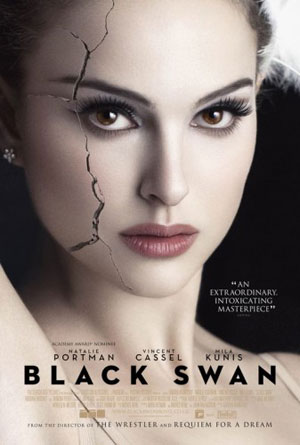LFF: Black Swan – 4*
 When a film as been lauded about so much, and its star is on the road to picking up every top acting accolade going, it’s hard to get an subjective view on whether the film itself is exceptional. Natalie Portman is definitely worthy of Academy Award recognition for her portrayal as a dancer spiralling out of control in Darren Aronofsky’s dark and bleak drama, Black Swan. That’s indisputable. A fragile-looking Portman has literally suffered for her art to be all consumed by the role in a film which less about ballet, and more about losing control in the act of striving for perfection. The ballet is merely a beautiful visual metaphor.
When a film as been lauded about so much, and its star is on the road to picking up every top acting accolade going, it’s hard to get an subjective view on whether the film itself is exceptional. Natalie Portman is definitely worthy of Academy Award recognition for her portrayal as a dancer spiralling out of control in Darren Aronofsky’s dark and bleak drama, Black Swan. That’s indisputable. A fragile-looking Portman has literally suffered for her art to be all consumed by the role in a film which less about ballet, and more about losing control in the act of striving for perfection. The ballet is merely a beautiful visual metaphor.
Portman as New York City ballerina Nina leads us on a spellbinding journey of despair into the darkest recesses of the human psyche with such innocent ease that you are never fully aware of exactly of what is truth and what is fiction at any one moment. In this sense, Aronofsky continually toys with our perceptions and reflects our thoughts back at us through Nina in the changing room mirrors.
Like the character Nina longs to play – a combination of both Swan Lake’s White and Black Swan Queen, each character in Aronofsky’s cleverly layered psychological thriller portrays both extremes of character, further blurring fact from fantasy in a scintillating manner.
Initially, Nina embodies the perfect, virginal nuances of the White Swan, deflecting suspicion away from her mindset, as those around her seem determined to corrupt her purity and crush her dreams. Nina’s mother (Barbara Hershey) seems controlling, mourning a lost ballet career. Nina’s artistic director (Vincent Cassel) seems intent on corrupting her. Nina’s new rival, Lily (Mila Kunis) is all friendliness to her face, but is competitive behind her back. Hence, Nina continually doubts her abilities as a dancer, even with endless, punishing practice, and turns to her own control therapy: dance.
Cassel oozes sexual prowess, displaying that potent and arousing vanity that comes from power and confidence, and is simply dangerously magnetic in the role of Thomas Leroy who stops at nothing to get what he wants. Hershey keeps the mystery of Erica’s true intentions a guarded and intriguing secret, whilst smothering Nina. She is both terrifying and pathetic, and captivating as you ponder her next move.
In what seems to be her quest to show a carefree and hedonistic side for the part of the Black Swan, Nina must make the ultimate sacrifice: her self control. Aronofsky’s film explores untapped sexual needs and desires, from self-exploration to lesbian lust in a lucid fashion. It seems like polar opposites for such a supposed virtuous character, but the creative world Nina inhabits is hungry for sensation, and the emotive music feeds the bodily reactions that begin to awaken in her. This is the genius of Aronofsky’s character; is Nina innocent to begin with, or is she deceiving us all? Aronofsky makes sure we empathise with her until the bitter end to make her dramatic exit so poignant and unforgettable.
Black Swan is an artistic masterpiece on its own, significantly realised by a distinguished performance from Portman and exemplary directing from Aronofsky. With the stirring emotions that the ballet and the music bring, this is a passionate thriller that fuels the age-old battle of good verses evil within with a chilling contemporary twist, and in a world that cruelly wants nothing but short of perfection. It should not be missed.
4/5 stars
By @FilmGazer